- Home
- Lorenzo Carcaterra
Sleepers Page 2
Sleepers Read online
Page 2
“Let’s name it after the Count of Monte Cristo,” John said.
“Nah,” I said, shaking my head. “Let’s name it after one of the Musketeers.”
“Which one?” Tommy asked.
“D’Artagnan,” I said immediately.
“To start with, he’s not a made Musketeer,” Michael said. “He just hangs with them.”
“And he’s only cool ’cause he’s got three other guys with him all the time,” Tommy said to me. “Just like you. Alone, we’re talkin’ dead man. Just like you. Besides, we’ll be the only ones with a French guy’s name on the side of our cart.”
“That oughta be good enough to get our ass kicked by somebody,” Michael observed.
“Go with the Count,” John said. “He’s my hero.”
“Wolf Larsen’s my hero,” Tommy said. “You don’t see me bustin’ balls about gettin’ his name on the cart.”
“Wolf Larsen from The Sea Wolf?” I asked. “That’s your hero?”
“Yeah,” Tommy said. “I think he’s a real stand-up guy.”
“The guy’s a total scumbag.” Michael was incredulous. “He treats people like shit.”
“Come onnn, he ain’t got a choice,” Tommy insisted. “Look at who he deals with.”
“Scumbag or not,” Michael said. “Wolf’s name would look better on the cart.”
“They’ll think we named the friggin’ cart after our dog,” John muttered.
“We don’t got a dog,” Tommy said.
“Okay, it’s settled,” I told everybody. “We name the cart Wolf. I think it’ll bring us luck.”
“We’re gonna need more than luck to beat Russell’s crew,” John said.
“We may lose this race,” Michael announced. “But we ain’t gonna lose it to Russell.”
“He’s always there at the end, Mikey,” I said.
“We always look to block him at the end,” Michael said. “That’s our mistake.”
“He stays away till then,” Tommy said. “He’s no dope. He knows what to do.”
“Maybe,” Michael said. “But this time we go and get him outta the race early. With him out, nobody comes near beatin’ us.”
“How early?” I asked.
“Right after Tony Lungs drops the flag,” Michael said. “Near the hill.”
“How?”
“Don’t worry,” Michael said. “I got a plan.”
“I always worry when you say that,” I said.
“Relax,” Tommy said, putting the final paint strokes on the wood. “What could happen?”
A DOZEN GO-CARTS were ready to go, four to a row. I was behind the unsteady wheels of Wolf, on the front line, next to Russell Topaz’s cart, Devil’s Pain. The crowd of onlookers, drawn out by the heavy September heat, was larger than most years, standing two deep behind rows of illegally parked cars. Thick-armed men in white T-shirts held kids atop their shoulders, wives and girlfriends at their sides, red coolers filled with beer and soda by their feet. Tenement windows were open wide, old women leaning out, stubby arms resting on folded bath towels, small electric fans blowing warm air behind them.
I looked over at Russell, nodded my head, and smiled in as friendly a way as I could manage.
“Hey, Russell,” I said.
“Eat shit, greaseball,” he said back.
Little was known about Russell or the three other boys who were always with him, each as sullen as their leader. We knew he went to St. Agnes on West 46th Street, which meant he wore knickers. That alone was enough to permanently ruin his mood. He lived with foster parents on West 52nd Street, in a building guarded by a German shepherd. There were two other foster children in the family, a younger boy and an older girl, and he was as mean to them as he was to everybody else.
He liked to read. Many times I would see him in the back room of the public library on West 50th Street, his head buried in a thick book about pirates loose on the high seas. He played basketball on the playgrounds for pocket money and was never without a lit cigarette. He had no girlfriend, always wore a brown leather vest, and hated baseball.
I couldn’t help but stare at Russell’s cart. It was made of fresh wood and was unpainted except for the name stenciled on both sides. The rear wheels were thick and new and the brakes were molded from real rubber, not the blackboard erasers we used on ours. His crate seat was padded and the sides were smooth. He had on black gloves and a Chicago Bears helmet. His three teammates were in sweatpants and sneakers, had handkerchiefs tied around their heads, and also wore gloves.
“You a Bears fan?” I asked him, waiting for the starting flag to drop.
“No, asswipe,” Russell said. “I’m not.”
Russell was chubby with a round face, soft, pudgy hands, and a practiced sneer. A small scar decorated his right brow, and he never smiled, even in victory.
“They got a great coach,” I said. “My dad says he’s the best football coach ever.”
“Who gives a shit?” was Russell’s always-pleasant response.
“What’s goin’ on?” Michael asked, leaning next to me.
“We were just wishing each other luck,” I explained.
“Never mind that,” Michael told me, lowering his voice. “You all straight on what you have to do?”
“No,” I said.
“Just remember, at the hill, don’t swing away,” Michael said. “Go right at him. It’ll knock him off balance.”
“What if it doesn’t?”
“Then you’re on your own,” Michael said.
TONY LUNGS, OUR local loan shark and the benefactor of this yearly event, stepped forward, facing the carts, wiping his brow with the starter’s flag. Below his checkerboard shorts were black loafers, no socks, and he also wore no shirt. The folds of his belly hung over the beltless loops of the garish pants. He ran a hand over his bald head, scanning the crowd: “What say we get this thing started?”
Tony lifted his right arm, holding the starter’s flag high enough for all to see. The crowd began to chant and applaud, eager for action. I moved the go-cart a couple of inches forward, leaving only elbow room between Russell and myself.
“Remember,” Michael whispered. “At the hill, make your cut. The rest is pure race.”
Tony Lungs moved his head from left to right, checking to make sure the carts were in proper position.
“Get ready!” he shouted. “Get set! And remember, any fuck runs over my toes gets their ass kicked. Now, go!”
I ran over the starter’s flag as Tommy, Michael, and John pushed our cart up the street.
“How are the pedals workin’?” Tommy asked, his face red from the effort.
“Good,” I said.
“Watch yourself,” John said, looking at the other carts. “I seen three zip guns already, and you know Russell’s got something in his cart.”
“Don’t worry,” Michael said. “Just get to the hill.”
THE CROWD NOISE grew louder as the carts made their way past Fat Mancho’s candy store, where all the betting action took place. The people of Hell’s Kitchen would lay bets on anything, and go-cart racing was no exception. To the working poor of the neighborhood, gambling was as time-honored a tradition as church on Sunday morning, boxing matches on Friday nights, and virgin weddings all year round.
Devil’s Pain was listed on the large blackboard outside Fat Mancho’s store as the 3-1 odds-on choice. Wolf, our cart, was down as second favorite at 5-1. Freddie Radman’s cart, Eagle’s Anger, was the long shot in the field, going off at 35-1. That was primarily because the three years Radman had bothered to enter the race, he always quit halfway through, abandoning his vehicle and walking away. “You gonna waste a whole lotta time bettin’ on Radman,” Fat Mancho said. “Might as well set fire to your money.”
WE WERE COMING up to the edge of the hill, Tommy, Michael, and John sweaty and breathless from the hard pushing. We were in the middle of the pack, Russell still on our left, a Puerto Rican crew from Chelsea driving a purple cart on our right.<
br />
“More speed,” I told the guys. “We’re not getting there fast enough.”
“Relax,” Michael said. “We’re right where we’re supposed to be.”
“If I go any faster, I’ll have a heart attack,” John muttered between wheezes.
The brake pads by my feet flapped against the sides of the cart and one of the front wheels started to wobble.
“I don’t know if these brakes are gonna hold,” I said.
“Don’t think brakes,” Michael hissed. “Think speed.”
“How do I stop?” I asked with a hint of panic.
“You’ll hit somethin’,” Michael said. “Don’t worry.”
“That’s what I love, Mikey,” I told him. “You just think of everything.”
AT THE TOP of the hill I was on my own, two feet from Russell’s cart. We quickly glanced at each other, the sneer still on his face. I locked my cart against his, the spin of my wheels chopping at his wood, trying to move him over to the hard side of the curb.
“Don’t, man,” Russell shouted. “You’re gonna lose a wheel.”
A cart driven by a pock-faced redhead in goggles was up behind me, pushing me even closer into Russell. My hands were raw and my legs stiff. We came down fast, the carts bunched together, my hopes of knocking Russell from the race diminishing with each wobbly spin of my front wheel.
At the south end of 11th Avenue, a few feet from a Mobil gas station crowded with onlookers, the front wheel finally gave way and snapped off. The cart tilted down, breaking pace with Russell, small sparks shooting from the pavement.
“You’re lookin’ at a wheelchair,” Russell yelled at me as he zoomed past, snarl locked in place, not even the slightest hint of pity in his voice.
I was heading straight for a street divider, the eraser brakes my feet were pumping now as useless to me as the rest of the cart. The remaining carts had gone straight down the street, toward 12th Avenue. The skin on my hands was split and streams of blood ran through my fingers. Holding the ropes as tight as I could, I used my weight to steer away from the divider.
The cart was starting to lose some speed, but still moved with enough force to do damage. My arms were tired and I couldn’t hold the ropes any longer: The nylon ridges were cutting in too deep. I let go and braced myself against the sides of the Dr. Brown case. The cart veered wildly left and right, bounced across 11th Avenue, past a double-parked station wagon, jumped the curb, and slammed against the side of a corner mailbox.
I got out, kicked it angrily over onto its side, and sat down on the fender of a parked Chevy. I put my face up to the sun and my elbows on the trunk and waited for Michael, Thomas, and John to make their way down the hill toward me.
“You okay?” John wanted to know, pointing to my hands, which were bleeding badly.
“What happened?” Michael asked. “We saw you locked in with Russell, then we lost you in the crowd.”
“Woulda taken a bulldozer to knock over Russell’s cart,” I said.
“Next year we gotta steal better wood,” Tommy said. “And maybe get better sets of wheels.”
“I’m sorry,” I said. “I thought we’d do better.”
“That’s okay,” Michael said. “Not your fault. You just suck as a driver.”
“Mikey’s right,” John said. “You ain’t exactly Andretti behind the wheel.”
“I ain’t got a wheel, first of all,” I said. “And Andretti’s got brakes.”
“Little things,” Michael said sadly. “You let little things get to you.”
“I hate you guys,” I said.
“Next year we’ll get you a parachute.” John patted me on the back. “Make your bailout a lot easier.”
“And gloves too,” Tommy said. “Black ones. Like the real race drivers wear.”
“I really hate you guys.”
We walked together back to Tenth Avenue and Fat Mancho’s candy store to get some ice and clean rags for my bloody hands.
2
MY THREE FRIENDS and I were inseparable, happy and content to live within the closed world of Hell’s Kitchen. The West Side streets of Manhattan were our private playground, a cement kingdom where we felt ourselves to be nothing less than absolute rulers. There were no curfews to contend with, no curbs placed on where we could go, no restrictions on what we could do. As long as we stayed within the confines of the neighborhood.
Hell’s Kitchen was a place where everyone knew everything about everybody and everybody could be counted on. Secrets lived and died on the streets that began on West 35th and ended on West 56th, bordered on one side by the Hudson River and on the other by the Broadway theater district. It was an area populated by an uneasy blend of Irish, Italian, Puerto Rican, and Eastern European laborers, hard men living hard lives, often by their own design.
We lived in railroad apartments inside redbrick tenements. The average rent for the typical six rooms was $38 a month, gas and utilities not included, payment due in cash. Few mothers worked and all had trouble with the men they married. Domestic violence was a cottage industry in Hell’s Kitchen. Yet there was no divorce and few separations, for Hell’s Kitchen was a place where the will of the Church was as forceful as the demands of a husband. For a marriage to end, someone usually had to die.
We had no control over the daily violence that took place behind our apartment doors.
We watched our mothers being beaten and could do little more than tend to their wounds. We saw our fathers romance other women, sometimes dragging us along to serve as alibis. When their anger turned to us, our fathers were just as brutal. Many were the mornings when my friends and I would compare bruises, welts, and stitches, boasting of the beatings we had taken the previous night.
A lot of the men drank, stomachs full of liquor fueling their violent urges. Many of them gambled heavily, large portions of their union paychecks making their way into the pockets of bookies. This lack of table money also contributed to the charged atmosphere of our private lives.
Yet despite the harshness of the life, Hell’s Kitchen offered the children growing up on its streets a safety net enjoyed by few other neighborhoods. Our daily escapades included an endless series of adventures and games, limited only by imagination and physical strength. There were no boundaries to what we could attempt, no barricades placed on the quest for fun and laughter. While many were the horrors we witnessed, our lives were also filled with joy. Enough joy to fend off the madness around us.
In the summer months my friends and I played games that ran the gamut of inner-city pastimes in the early 1960s: sewer-to-sewer stickball with sawed-down broom handles substituting for bats and parked cars used as foul lines; eighteen-box bottlecap tournaments, where a cap filled with melted candle wax was hit by hand into numbered chalk squares; Johnny-on-the-pony; stoop ball and dodge ball; knock hockey and corner pennies. In the evenings, wearing cutoff T-shirts and shorts, we washed off the day’s heat with the cold spray of an open fire hydrant.
In the fall, roller hockey and ash can football took over the streets, while in the winter we would fashion sleds from cardboard boxes and wooden crates and ride them down the icy slopes of 11th and 12th Avenues.
Throughout the year we collected and hoarded baseball cards and comic books and, on Monday and Friday nights, walked the two long blocks to the old Madison Square Garden on Eighth Avenue to watch as many boxing and wrestling matches we could sneak our way into, innocently believing both sports to be on the same professional level: To us, Bruno Sammartino was Sonny Liston’s peer.
We raced pigeons across rooftops and dove off the 12th Avenue piers into the waters of the Hudson River, using the rusty iron moorings as diving boards. We listened to Sam Cooke, Bobby Darin, and Frankie Valli and the Four Seasons on portable radios and imitated their sounds on street corners late into the night. We started to think and talk about girls, hormones fueled by the cheap skin magazines handed down to us by older boys. We went to the movies once a week and saw the second acts of any Wednesda
y Broadway matinee that caught our fancy, allowed in by the ticket matrons who worked the theaters and were our neighbors. Inside those ornate and darkened halls, standing in the back or sitting on the top steps of the balcony, we laughed at the early comedies of Neil Simon, were moved by the truth of A View from the Bridge, and admired the pure showmanship of My Fair Lady. The only show we avoided was West Side Story, insulted by its inaccurate depiction of what we thought of as our way of life.
There was also an active competition among the four of us to see who could come up with the best and boldest prank.
Tommy had his best moment when he set loose a small shopping bag filled with mice during a Saturday afternoon mass honoring a retiring nun. The sight of the mice sent the nearly two dozen nuns in attendance running for the front doors of Sacred Heart Church.
Michael scored a bull’s-eye when he got a number of older kids to help him switch the living room furniture in the apartments of two men who had a decade-long feud raging between them.
On one hot summer afternoon, John climbed three floors of fire escapes to reach the crammed clothesline of the meanest woman in the neighborhood, Mrs. Evelyn McWilliams. Hanging upside down and shirtless, his legs wrapped around thin iron bars, he took her laundry off the line, folded the clothes neatly as he could, put them in an empty wine box, and donated them to the Sisters of Sacred Heart Convent, to be distributed to the needy.
For the longest time my pranks never measured up to those my friends managed with such apparent ease. Then, two weeks into the 1963 school year, I found a nun’s clacker in a school hallway and was ready for the big leagues.
THE GIRLS SAT on the left-hand side of the church, the boys on the right, all of us listening to another in a series of inane lectures on the sacrament of confirmation. Three nuns, in white habit and cloth, sat behind the four rows of girls. One priest, Father Robert Carillo, sat behind the boys. It was early afternoon and the lights of the large church were still dark, votive candles casting shadows over the wall sculptures depicting Christ’s final walk.

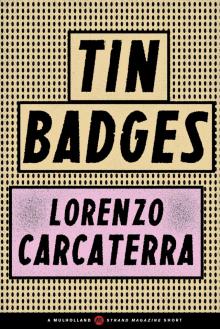 Tin Badges
Tin Badges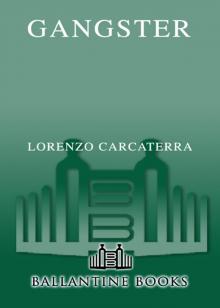 Gangster
Gangster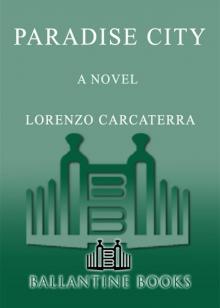 Paradise City
Paradise City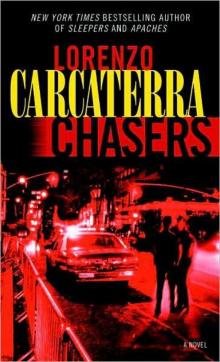 Chasers
Chasers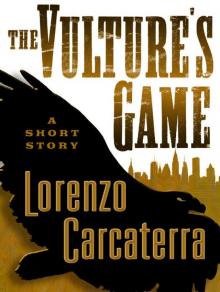 The Vulture's Game
The Vulture's Game Payback
Payback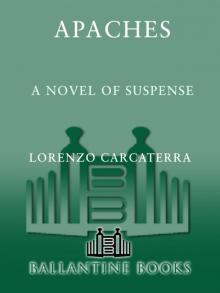 Apaches
Apaches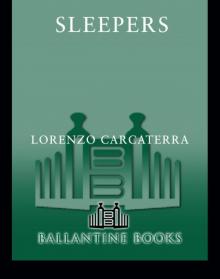 Sleepers
Sleepers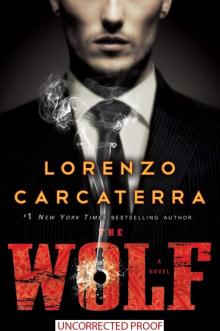 The Wolf
The Wolf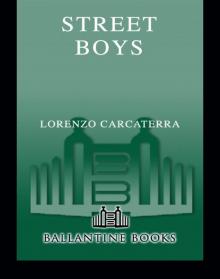 Street Boys
Street Boys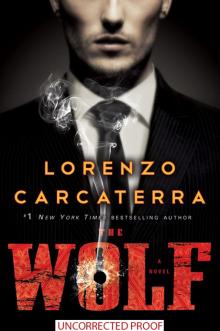 The Wolf: A Novel
The Wolf: A Novel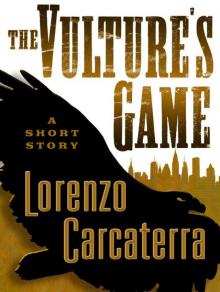 The Vulture's Game (Short Story)
The Vulture's Game (Short Story)